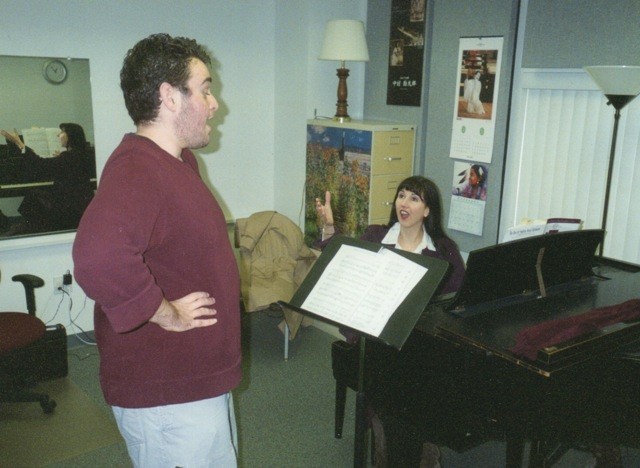How to Find the Right Voice Teacher for You, Part 2: Where do I look to find a quality teacher?
So after reading Part 1 of this series, you’ve now decided that you definitely need a voice teacher, and not a vocal coach. What’s a singer to do who is looking for a voice teacher? Where do you look? As with anything else, it starts with being an informed consumer. Here is a brief guide to help you in your search for the best teacher for you:
1. Personal referral is always your best bet.
Ask your friends who sing who they study with. If they like their teacher and are experiencing vocal growth, there’s a good chance that their teacher might be a good choice for you. Ask if you can attend one of their lessons and experience the teacher’s personality and teaching style first-hand. Most good teachers welcome visitors— especially one who might become a new student!
2. Ask educational and industry professionals. Talk to your choir director at church or school, or if you study an instrument, your instrumental teacher might have a good referral for a voice teacher. Good musicians and teachers know other good musicians and teachers! If you sing in musicals, ask your play’s director or music director, or if you are around music producers or recording engineers, check with them. If you are at the point where you have an agent or manager, they may have teachers they know and trust to work with you.
3. NATS.org. This is the National Association of Teachers of Singing, of which I am a member. Many excellent voice teachers belong to this group nationwide, and you can search for one on the NATS website by zip code to find one near you. The listings also give details, such as what styles of singing the teacher will work with, as well as preferred age ranges of their students.
4. Local college music departments. Call your local community or four-year college music department, and ask them to refer a teacher who not only teaches at the college itself, but also sees private students. (I do both as well). I would not study with a teacher who doesn’t at least have a Master’s Degree in Vocal Performance and/or Pedagogy (how to teach voice). This is usually a minimum requirement for a voice teacher in higher education.
5. Local Private Music Schools. Buyer beware! There are terrific teachers to be found anywhere, but I find the greatest variance in quality at private commercial music schools. Some of them do not have stringent requirements regarding the teachers they employ, and consequently, there are many students who have frustrating experiences, either making little progress, or even worse, getting bad training that may hurt their voice. Check the reputation of the school and the teacher, and try to interview students who have actually studied with the exact teacher you are considering. If you do your due diligence, you can still find a good teacher in this setting.
6. Online Music Schools. The same caveat applies as with local brick and mortar schools— buyer beware! Again, you might find a gem, but it’s a lot tougher to vet a teacher at an online school, and you may have to commit to multiple lesson packages (be careful of this with any teacher or school). Also, the rates vary widely, so be careful of very inexpensive teachers. They are usually just starting out, and are much less experienced.
7. Online Search. Yes, you can go ahead and do an online search for “voice teachers” or “singing teachers” in your area, and it can net you great results. Quite a few of my private students found me through Google, or on Yelp. But, again, be careful. Talk to that person on the phone and really get a feel if this will be the right person for your vocal needs. (Check my next post, coming soon, Part 3 of this series: How to Interview a Voice Teacher). Also, look at the online reviews. While there will almost always be a rogue review that doesn’t fit the overall profile, if most of the reviews are favorable, it’s a safe bet that this might be a good person to look into. Check the teacher’s website as well! There should be lots of helpful information there to guide you about their education, teaching philosophy, and professional experience, even before you decide to call the teacher and interview him/her.
8. After-school programs
If you are looking for a voice teacher for your child, many schools now offer after-hours programs in the arts. In addition to my college position and my private studio, I’ve taught for years at a private high school which has an after-school Vocal Conservatory. Depending on the structure of the program, your child could be in a class with a handful of other students, meaning they won’t get as much one-on-one time. But, they could receive some good general instruction, with a little bit of personal attention during the semester. At the high school where I taught until this school year (I gave that up to focus on my blogging!) some of the classes only had one or two people in them, so I could work more in depth with those individuals. And, depending on the school, this can be a less expensive option than private lessons. The choral program where I taught subsidized part of the fee for the voice classes, in order to attract more students and improve the quality of their singers and performing groups. A great idea!
As you can see, there is no shortage of voice teachers out there, and plenty of ways to find one! The trick is making sure you find a good teacher, and the right one for you. Stay tuned for Post #3 in this series, where I’ll give you all the right questions to ask when you call to interview the teachers you have found. In the meantime…
Happy Hunting!







